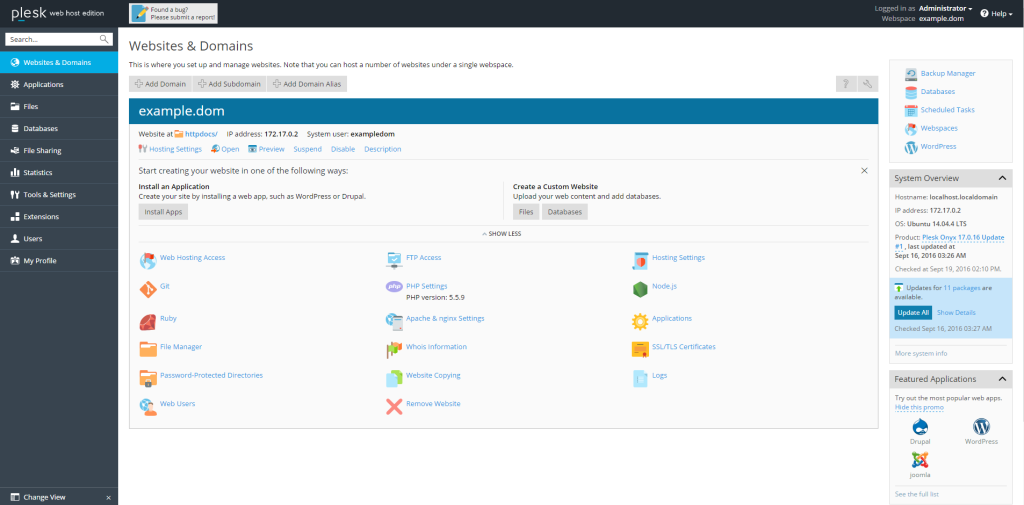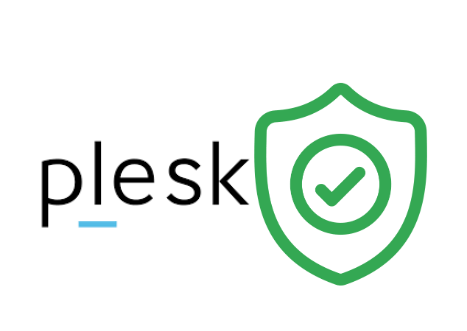Plesk stands as a paid web hosting control panel designed to streamline the administration of web hosting servers. With its user-friendly interface, it empowers users to effortlessly oversee diverse elements of their websites and server settings, eliminating the necessity for advanced technical expertise. It is compatible with both Windows and Linux operating systems.

Table of Contents
Plesk control panel encompasses the following key features:
- Website Management: Effortlessly create, modify, and delete websites. it’s facilitates the management of website files, databases, and domain settings.
- Server Administration: Equipped with tools for server administrators to oversee server settings, monitor performance, and install software packages.
- Email Management: Users can create and manage email accounts, configure email forwarding, and handle other email-related settings.
- Security: Plesk integrates SSL certificate management, firewalls, and antivirus tools to enhance the security of websites and servers.
- Database Management: Supports various database management systems like MySQL and PostgreSQL, enabling easy creation and management of databases.
- One-Click Installations: Offers one-click installations for popular web applications, simplifying the deployment of content management systems (CMS) and other software.
- User Account Management: Allows administrators to create and manage user accounts with varying levels of access, fostering collaboration in a hosting environment.
- Backup and Restore: Features tools for creating backups of websites, databases, and server configurations, crucial for disaster recovery or migration purposes.
Web hosting providers, system administrators, and website owners leverage this to optimize the administration of web hosting infrastructure. Its objective is to enhance accessibility and efficiency in hosting and server management, catering to users with diverse levels of technical expertise.
Advantages of Opting for Plesk Control Panel:
- Intuitive User Interface: Plesk delivers an intuitive and user-friendly interface, catering to both novices and seasoned users, facilitating the seamless management of their hosting environment.
- Multi-Platform Support: Compatible with both Windows and Linux servers, it provides flexibility for users operating in diverse hosting environments.
- Comprehensive Feature Set: Plesk boasts an extensive array of features, encompassing website management, server administration, email management, security tools, and one-click installations of popular applications.
- Automation and Scripting: Plesk supports task automation, saving time and minimizing the risk of human errors. It also caters to advanced users with scripting capabilities.
- Security Features: With SSL certificate management, firewalls, and antivirus tools, it is fortifying the hosting environment, enhancing overall security.
- Scalability: Plesk is scalable, accommodating the management of a single website or multiple websites on a server. This scalability proves beneficial for both smaller websites and larger hosting environments.
- One-Click Installations: Simplifying the installation process with one-click installations, This is a convenient solution for users seeking to deploy popular software without navigating through complex manual setups.
Disadvantages of Opting for Plesk Control Panel:
- Cost: Plesk operates as a commercial product, and although it offers a free trial, obtaining the full version may entail a licensing fee. This cost consideration can be significant, particularly for small website owners or hobbyists.
- Resource Usage: Some users have reported that it can be resource-intensive, potentially consuming more server resources than alternative control panels. This could pose concerns for users operating with limited resources.
- Learning Curve: Despite Plesk’s user-friendly design, there may still be a learning curve for users new to web hosting. Individuals with no prior experience might initially find it overwhelming.
- Customization Limitations: While feature-rich, Plesk may present limitations in customization for advanced users when compared to other control panels that allow more extensive manual configurations.
- Dependency on Updates: Users may rely on Plesk updates for access to new features and security patches. Delays in updates could potentially expose the server to security vulnerabilities.
- System Resource Usage: Some users have observed that this can significantly consume system resources, potentially impacting the overall performance of the hosting environment.
- Not Open Source: Plesk is not an open-source software, meaning users lack access to the source code for customization. This aspect might be a concern for users who prefer open-source solutions.
Here is a comprehensive list of features available in the Plesk control panel:
- Changing passwords required to access the control panel.
- Modifying web space through FTP.
- Removing, installing, and managing databases and web applications.
- Installing SSL certificates to enhance security for online transactions. Note that a dedicated IP address is necessary for SSL certificate installation, as it is not possible on a shared IP address.
- Removing, setting up, and managing subdomains.
- Hosting personal web pages for others to utilize.
- Implementing password protection to secure specific areas of a website.
- Customizing web server error messages.
- Backing up and restoring websites, including databases and applications.
- Easily scheduling backups.
- Creating, modifying, and removing mailboxes while ensuring protection against viruses and spam.
- Providing individual email admin panel access to users with mailboxes, particularly useful for running mail hosting services or managing user mailboxes.
- Creating, modifying, and removing mail forwarders and automatic replies.
- Managing and removing mailing lists and their associated users.
Conclusion:
Utilizing the Plesk control panel eliminates the need for accessing a separate Domain Admin or Email Admin’s control panel. All these features are readily accessible from your own control panel. These examples highlight the advantages and benefits offered by the Plesk control panel.



